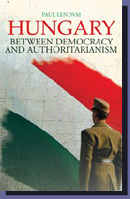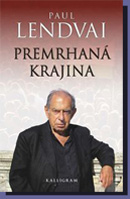|
Review by
Stefan Wagstyl is the Financial Times emerging markets editor
The case against Viktor Orbán is set out with great passion in this
convincing indictment of the most powerful political figure in the eastern
EU. Until recently it seemed that while the EU’s new member states faced
economic challenges on the arduous road to convergence with western Europe,
their commitment to the EU’s political values was never in doubt. The
victory of democracy after decades of one-party rule in eastern Europe was
regarded as permanent.
Hungary is now testing this assumption to the limit. The country that a
decade ago saw itself as a leader of post-communist transition has become
the first of the new member states to see its commitment to democratic
principles come under scrutiny.
In the eyes of many critics, Viktor Orbán, Hungary’s conservative prime
minister, is constructing an authoritarian state on the banks of the Danube.
Furthermore, he is building it on rocky economic foundations: the country is
heavily in debt and its economic policies are under fire from the EU and the
International Monetary Fund. The risk of political and economic turmoil is
very real.
The case against Orbán is set out with great passion in Hungary: Between
Democracy and Authoritarianism. In Paul Lendvai’s view, Orbán is “a master
tactician, a gifted populist, a radical and consummate opportunist, and a
ruthless power politician who believes not in ideas but in maximising his
power without any compunction, giving vent to Hungarian nationalism or
tapping into fear and prejudice at a moment of crisis”. He calls Orbán’s
Fidesz “a charismatic ‘Fuhrer’ party”. This is gloves-off political writing
at its best.
Orbán came to
prominence as a radical liberal student leader in the dying days of
communism. But he soon realised that while the liberals in post-communist
Europe had the best ideas, they had little support outside urban elites.
So the opportunistic Orbán headed to the right and built up a formidable
conservative-clerical-nationalist power base infused with more than a touch
of xenophobia.
Backed by a two-thirds parliamentary majority, he has rewritten the
constitution, increased state control of the media and the courts, and
reorganised parliament and constituencies in favour of his ruling right-wing
Fidesz party. As European Commission president José Manuel Barroso has said:
“There are concerns about the quality of democracy in Hungary.”
Lendvai is a somewhat
controversial figure in Hungary. A Jewish survivor of the Nazi terror, he
joined the Communist party and became a journalist before fleeing to the
west after the failed 1956 anti-Communist uprising. He settled in Vienna,
where he worked as a correspondent – including for the Financial Times – and
later as a senior editor in Austrian state broadcasting.
In this book he tries hard to be fair. The Socialists are justifiably
blamed for paving the way for Orbán’s triumph, thanks to corruption and
incompetence – especially in economic management. Lendvai rightly puts Orbán
in the context of Hungary’s dark 20th-century history – the 1920 Trianon
treaty, when Hungary lost a huge chunk of territory, the 1930s dictatorship,
collaboration with the Nazis, the legacy of 1956, and the awkwardly
incomplete end of communist rule. Neither the political right nor the left
come out of this story with much credit.
But he is surely correct to
say that it is Orbán who is largely responsible for taking the dangerous
road on which Hungary is now travelling. His huge 2010 victory gave him an
opportunity to reach out to enemies, pursue inclusive policies and create a
consensus for serious economic reforms and for securing backing from the EU
and IMF. Instead, Orbán has gone for conflict and division, and adopted
populist economic policies that are viewed sceptically by the EU, the IMF
and the markets.
Lendvai’s book is not the final word on Orbán. But it is a convincing
indictment of the most powerful political figure in the eastern EU.
Book
Review By Kester Eddy, Budapest June 7th 2012
Democracy is an
unwieldy, cumbersome form of government at the best of times. This anecdote,
described by Vienna-based journalist Paul Lendvai in his book, "Hungary:
Between Democracy and Authoritarianism", shows how even more cumbersome was
the process of trying to establish democracy after 40-plus years of one
party rule.
In 256 pages, the Hungarian-born author surveys the
tumultuous past quarter century of Magyar history, from the collapse of
communism in 1987-89 to the current regime of Viktor Orban.
Lendvai is scathingly critical of later Socialist prime ministers (Peter
Medgyessy, who came to power in 2002, in particular), but given the
remarkable rise of Viktor Orban to the summit of political power in Hungary,
first in 1998 and again in 2010, and the subsequent partisan politicking
that he has inspired throughout these years, it is understandable that much
of the later pages focus on the former dissident law student.
A colleague described this book as "anti-Orban": but it is more than that.
Lendvai shines a light into the murky, swirling psychological undercurrents
that have dragged – and in the author's view, are once again dragging – the
peculiar waters of Hungarian patriotism into a damaging and ultimately
self-defeating nationalism: and, as Lendvai repeatedly points outs, this is
once again against the weight of historical evidence.
A history of
Hungary is unlikely to be
a global best seller, but this will surely be high up the "must-read" list
for foreign diplomats and politicians who need to deal with
Budapest – and will be so for
many years to come.
read full
article at
Business News Europe Bne
Die
Zeit
"Paul Lendvai, the Hungarian writer with Budapest roots, sheds light upon
the darkening internal affairs of the young Hungarian democracy. . . . He is
an indispensable guide to the country and its politicians."
Süddeutsche Zeitung
"This book should become prescribed reading for all Europeans."
Paul Hockenos, The Boston Review
"Paul Lendvai is one of the grand old men of Central European journalism. .
. but never before has one of his titles provoked such fierce reactions from
the powers that be."
István Deák, author of Beyond Nationalism: A Social and Political
History of the Habsburg Officer Corps, 1848–1918
"No one could describe with more personal familiarity, expert knowledge, and
literary panache Hungary’s perilous travels from the foundering of communism
in 1989 to today’s economic and moral crisis. Is this the end of the
country’s liberal experiment? Have the brave attempts failed to perpetuate a
tolerant and mutually respectful civil society? It is actually a good sign
that Paul Lendvai s brilliant analysis, with its anxious warning, has been
published and is proving highly popular in Hungary."
Frederick Kempe, president and CEO of the Atlantic Council, author of
Berlin 1961Frederick Kempe, president and CEO of the Atlantic Council,
author of Berlin 1961
"Paul Lendvai is a legend. No one knows Hungary better or is better equipped
to navigate its political descent. Lendvai’s thesis weaves the critical
insights of an outsider with a native’s fluency and understanding, all
translated through a journalist’s eye for detail and narrative, to portray
the grim reality of a teetering democratic society."
Walter Laqueur, author of After the Fall: The End of the European
Dream and the Decline of a Continent
"Hungary faces a major crisis affecting its national economy, as well as its
foreign policy. With the country moving away from Europe, it is no longer
certain whether it will remain part of it. In this critical situation, Paul
Lendvai’s book provides an authoritative account of the background of this
crisis and its likely outcome."
Professor Shlomo Avinery, in Dissent, New York
„His book is essential for understanding current realities in Hungary. He
brings to his analysis a Mitteleuropa sensitivity tzo nationalism,
minority rights and historical memory.“
Times Literary
Supplement, London
„One has to agree with Lendvai`s conclusion that today Hungary is
effectively a one-party state with a thin veneer of democratic pretence.“
Foreign
AFFAIRS, New York
„Although Lendvai`s indictment sharpest against Hungary`s
current leader, he makes plain that the corruption and economic recklessness
of earlier governments did their part to bring about the country`s
degradation. Not surprisingly, Lendvai`s assessment has kicked up more than
a little dust in Hungary.“
|



